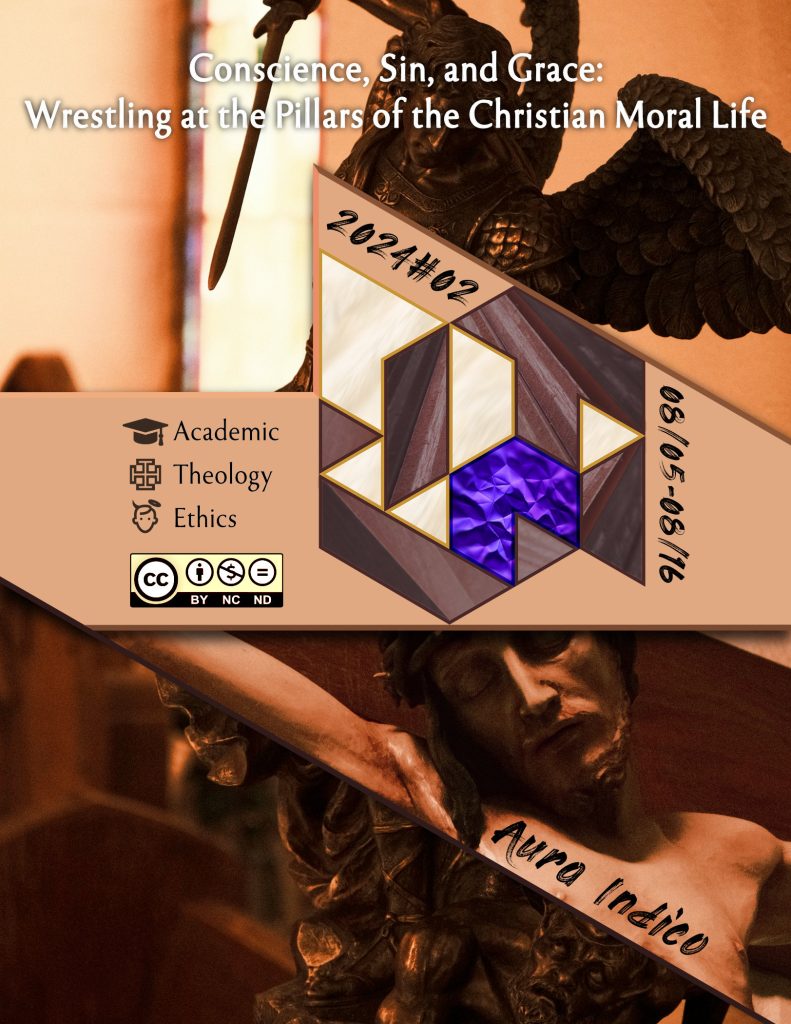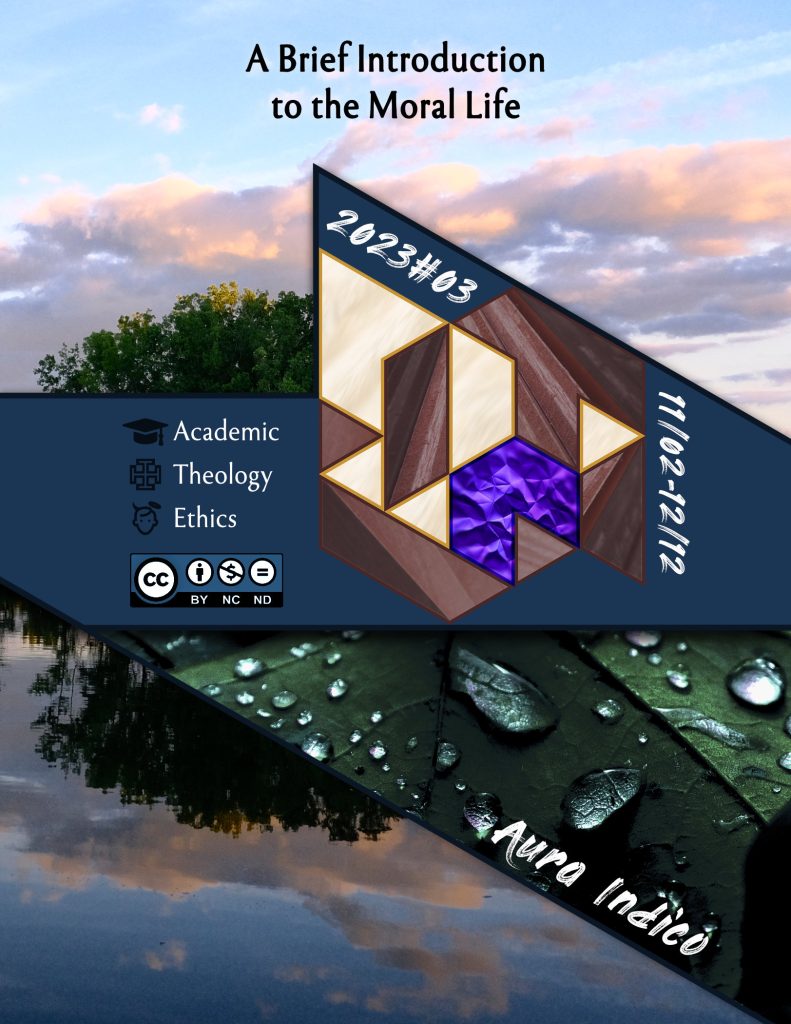Essay Archive
Below are essays for your consideration. The views expressed therein are mine alone; I would take them with a grain of salt, as I am not immune to cringe.
Academic | Theology | Ethics
2024, no. 3 (1-25).
CC: BY-NC-ND 4.0
Notes:
Reflection coming soon…
Intro:
We live our entire life as humans, yet so seamless is our experience that we may scarcely consider what sort of life it is we are living. The notion of our being is fundamental to, almost synonymous with, our existence, yet its particular character escapes our intuition as we pry it away for examination on its own; how can we possibly break apart something which is so foundationally constitutive to all we are? To what do we compare it? This search for meaning behind the human and his experience is as prevalent as it is mystifying, and it captures our fascination from the moment we encounter ourselves as a subject in act, when we take note of our perception and agency, when our properly human life begins to mature…
Academic | Theology | Ethics
2024, no. 2 (1-13).
CC: BY-NC-ND 4.0
Notes:
As the earnest Christian works out their salvation, they will at some point encounter the concepts of conscience, sin, and grace. The gravity of these concepts alone obligates us to inquire further, but amending our life in-practice proves challenging even once we learn much about them. This essay aims to outline the difficulties inherent in the intellectualization of our moral lives, and provides a vivifying alternative to throwing all our eggs in this basket. Adapted from a class exercise.
Intro:
In our exercise of conscience, our battle with sin, and our participation in the economy of grace, we not only engage our agency with intentionality through both interior and exterior acts of legitimate moral consequence, we also marshal our most intimately human traits towards the incomprehensible end of divinization. Every step in our engagement with the Christian moral life involves our interface with God through our rational faculties; in each case the veil between the material and spiritual world furnishes us with the trials which outline the crux of our moral development…
Academic | Theology | Exegesis
2024, no. 1 (1-11).
CC: BY-NC-ND 4.0
Notes:
The defilement of the soul is sin’s effect, when we have chosen familiarity with created goods over the love of God. The nature of sin itself is explored throughout the Bible, but reaches a climactic turning in the confrontation between Christ and His disciples, and the scribes and Pharisees, in Genezareth. This essay breaks open the theological underpinnings of Christ’s call to true purity, supplemented with historical notes aimed at contextualizing the Jewish practices mentioned only briefly therein. Overall, I seek to lay a thorough foundation for the faithful Christian’s understanding of purity in their own life; that the matter we consume is secondary to our intention in consuming it, the proper window into the moral dimension of our acts.
Intro:
In this examination of Christ’s discourse on what defiles a man, I seek to flesh out the pericope from both historical and theological perspectives, employing Benedict XVI’s analytical style. First, we broaden the context of the pericope’s unfolding from a “Method B” perspective: we will discern who the scribes and Pharisees were who opposed Jesus, what they understood as being “defiled”, and why they then opposed Christ. As we converge on the climax of the pericope’s narrative arc, we’ll come to explore the theological implications of Christ’s new teaching from a “Method A” perspective. Finally, refreshed with theological clarity, we will once again zoom out to examine literary aspects of the pericope from a synthetic “Method C” perspective: we will piece apart the differences between Matthew’s (15:1-15:20) and Mark’s (7:1-7:23) accounts, revealing Christ’s attitude towards the Old Law writ large, and the practical outcomes of these teachings of purity among those who follow Him…
Academic | Theology | Ethics
2023, no. 3 (1-14).
CC: BY-NC-ND 4.0
Notes:
In three chunks, I aim to present a foundational summary of the human moral life’s domains, in hopes of encouraging a thoroughly intentional earthly existence oriented towards the perfection of one’s natural and supernatural virtues. We start with an overview of the process of moral reasoning, discuss where morality emerges in human activity, and finish with a focus on Christian morality in specific. Adapted from (you guessed it) a class exercise.
Intro:
To begin a discussion on moral reasoning, the tangible, dynamic crux of our moral lives, we might do well to briefly distinguish it from moral science, wherein we consider the essence of morality itself, rather than the application of moral principles towards activity through the exercise of prudence. The first distinction we might make, then, is that moral science regards only speculative truth, while moral reasoning, taking these truths into account, ultimately applies them to individual circumstances in an evidently practical manner, terminating in an act if brought to fruition. We have, in moral reasoning, a process by which we take general moral knowledge and introduce individuating circumstances, through successive judgments by the intellect and corresponding acts of the will; these two will come together completely in the final execution of an action which has through this process become entirely personal…
Academic | Theology | Ethics
2023, no. 2 (1-14).
CC: BY-NC-ND 4.0
Notes:
Much like the class which inspired its creation, this essay aims at an encounter with moral theology at the broadest level, chiseling out its place in the overall schema of moral and theological considerations. In writing along these lines, I come to briefly discuss the nature of the human soul, the moral actor’s confrontation with dogma, and, of course, the doctrine of grace.
Intro:
Let’s start by considering moral philosophy in particular, the primary subject of which Wallace defines as “man himself, acting voluntarily and deliberately, for an end intended by and consonant with his rational nature.” This definition reveals a key point: in its investigations, moral philosophy is restricted to that knowledge which reason can discern; as it strives to apprehend the notion of man’s perfection, natural moral philosophy is restricted to the domain of human action as-informed-by reason. At its zenith, moral philosophy is able to demonstrate the existence of God, as St. Thomas demonstrated through his famous five ways, using reason alone; Gardeil stresses that this represents the very edge of natural human capacity, where we discover “an infinite that surpasses it.” Thus, we must reach beyond what truth reason alone can offer to grasp the infinite depth of our supernatural vocation: this is theology’s domain…
Academic | Neurophilosophy | Metaphysics
2023, no. 1 (1-13).
CC: BY-NC-ND 4.0
Notes:
Reflection coming soon…
Intro:
To discipline one’s will not only brings a human natural happiness through the consequent cultivation of virtue: depending on our cooperation with God’s gifts of infused and theological virtues, our free will is also the agency “by which we sin and live well,” and so move towards heaven or hell through our own participation. The object of the will is the appetible good; that good which is presented by our intellect and, once apprehended and understood, we desire and endeavor to move towards. We should seek every opportunity to bolster humanity’s efforts towards natural and supernatural happiness; promoting an accurate conception of the will in the sciences is key to unifying humanity in this noble aim efficaciously…
Practical | Management
2018, no. 2 (1-11).
CC: BY-NC-ND 4.0
Notes:
Adapted from a class exercise, this essay explores a hypothetical future circumstance where I may hire employees and ultimately guide the development of a workplace culture. Having experienced the plastic enthusiasm of American retail, I attempt to lay out a model which allows adequate room for organic workplace culture to develop while also implementing a novel synthesis of two well-documented communication strategies for effective conflict resolution.
Intro:
Because the managerial roles I’m likely to play for the foreseeable future will center around my studio business and directing research in the field of Cognitive Neuroscience, the majority of difficult personalities I anticipate mediating will likely either be causing tension in interpersonal workplace connections or may simply not be satisfying the standards at which they are expected to perform. I’ve traditionally approached confronting a subordinate through addressing several components I see as key to establishing a healthy, sustainable and productive Workplace Ethos…







